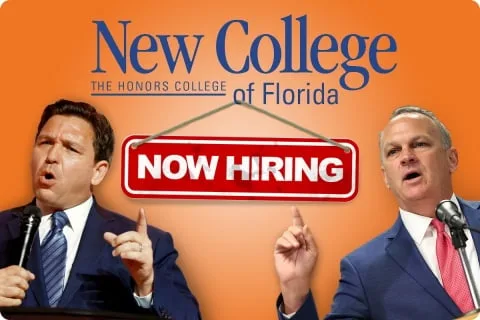
As the old adage goes, it’s not what you know but who you know that matters. And at New College of Florida, that cliché seems to be playing out in a number of recent hiring decisions.
An enrollment management director with no prior admissions experience. A dean of student affairs who has never worked in higher education. A general counsel imported from the State Senate. A head of donor relations who served as vice chair of the Republican Party of Sarasota. Those are just a few of the new hires made this year by the leaders of New College, which is in the midst of a dramatic makeover engineered by conservative trustees appointed in January.
Governor Ron DeSantis drove the selection of those new trustees, with four out of the six initial appointments coming from outside Florida. Their first order of business was to fire President Patrician Okker and install Richard Corcoran, a former GOP lawmaker and DeSantis ally, as interim president. Corcoran, who had never worked for a university before, was hired at the recommendation of new trustee Matthew Spalding.
Corcoran stepped in immediately, earning nearly double Okker’s salary even as an interim. At the time, Spalding referred to him as a close friend. Spalding now leads the presidential search committee tasked with hiring the next president, and Corcoran has been named as one of three finalists.
More new hires have followed, many of whom lack higher ed experience but have close ties to Corcoran or the Republican Party. That has raised alarms among longtime NCF supporters.
Political Connections
New College has generated national headlines for eliminating its diversity, equity and inclusion office; denying tenure to five professors despite approvals at every point of the process until the Board of Trustees; abruptly shuttering the gender studies program; and housing returning students in off-campus hotels while giving newly recruited athletes space in campus facilities.
But the administrative overhaul of the college has not attracted the same attention.
Since February, 77 employees have left NCF—six involuntarily—according to figures provided by the college, while 87 new full-time and 31 part-time employees have been hired. A number of the new administrators come from outside the higher education sector.
“A lot of these hires don’t seem like they have any particular background in higher education,” said one former employee who requested anonymity to discuss hiring concerns freely.
And at least a handful of the new hires have ties to the political world.
Kevin Hoeft, the new vice president of enrollment management, does not appear to have worked in admissions previously; rather, he came from the Florida Department of Education, where he served under Corcoran when the interim president was education commissioner. Hoeft also played a role in the state’s decision to ban an Advanced Placement course in African American studies. Some NCF critics have also raised concerns about his wife’s involvement in Moms for Liberty, an activist group that has driven the removal of books from libraries and K-12 schools over content concerns.
Bruce Abramson, the new executive director of new students and graduate admissions at NCF, taught computer science at the University of Southern California from 1987 to 1993, according to his website. Though not mentioned, he also taught as an adjunct at Carnegie Mellon University. And Abramson is the founder of the American Restoration Institute, which has posted frequently about “Islamists” and accused progressives of stoking Islamophobia. (Abramson did not respond to a request for comment.)
David Rancourt, the new dean of student affairs, has no higher education experience but was involved in Republican politics both as a lobbyist and a former aide for various GOP officials. He has also served as Florida’s director of elections and as deputy secretary of state.
Sydney Gruters, the executive director of the New College of Florida Foundation, which raises money for the college, is another new hire from conservative circles who does not appear to have any higher education experience. Gruters is a former GOP political aide and is married to State Senator Joe Gruters, a local Republican.
Also at the foundation: Alice Rothbauer, the newly hired executive director and vice president of advancement, who is a former regional field director for the Republican Party of Florida. Her LinkedIn profile does not indicate any prior involvement in higher education but says she spent 25 years as an independent beauty director for Mary Kay Cosmetics.
Hiring Practices
Numerous other hires, particularly in the newly established athletics program at New College, also lack experience in higher education but have served in similar positions at the K-12 level. Athletic director Mariano Jimenez Jr. was hired from the same job at Inspiration Academy, a private school owned by Eddie Speir, a trustee DeSantis put forth but who failed to win confirmation by the Legislature.
And a number of new hires—like Corcoran himself, who earned a law degree from Regent University—graduated from Christian colleges known for their conservative politics, such as Liberty and Bob Jones Universities. The practice of hiring from religious institutions was noted recently in a complaint filed against NCF with the U.S. Department of Education’s Office for Civil Rights.
“The athletics program has only hired coaches from Christian schools,” the complainant wrote, while also accusing NCF of disproportionately focusing athletics recruiting on Christian schools.
Critics have raised additional concerns about whether jobs were filled without proper searches.
Indeed, just how some new hires came about remains a mystery. But public records shared by American Oversight, a progressive nonprofit, shed some light on certain hiring decisions.
Abramson, the director of new students and graduate admissions, for example, had inquired about a potential role at NCF months before he joined the college in August. Robert Allen—a conservative New College graduate who some have claimed is the architect behind the DeSantis plan to remake the small liberal arts institution—appears to have facilitated that hire, connecting Abramson with the college when he asked about a teaching role.
Initially, Abramson pitched a course titled Information Integrity & Propaganda Defense: Survival Skills for the Information Age. It is unclear why he was hired in admissions rather than as an instructor—an area where he actually had prior experience—but his emails to Allen indicate one possibility.
“It occurs to me that when speaking to Richard Corcoran and/or the trustees, it’s likely to be easier to bring people into administration than onto faculty,” he wrote in an email American Oversight shared with Inside Higher Ed. “If so, the ideal way to bring me in would be to head a new Office of New Initiatives. Whether such an appointment would use a VP, Director, Dean, or other title would depend upon by-laws and institutional structure, but it should be doable with minimal red tape. From such a position, I can certainly engage in teaching—and the job would obviously involve working with existing programs and faculty.”
(Allen has also pitched Bruce Gilley—perhaps best known for a paper defending the merits of colonialism and clashing with colleges over diversity issues—as a potential faculty member. Gilley did not respond to a request for comment from Inside Higher Ed.)
New College officials aren’t willing to discuss their hiring practices. Sent a detailed list of 13 questions, NCF spokesperson Nathan March provided only hiring numbers and a brief statement defending the college’s practices. March did not reply to a request for more information.
“New College of Florida aspires to hire the best professionals to fill the many positions on campus,” March wrote. “The individuals hired have proven excellence in their respective career fields, and have demonstrated the ability to transfer those knowledge, skills, and abilities to the needs of New College.”
March himself is a new hire without previous experience in higher education.
Breaking Norms
Hiring employees from outside higher education isn’t altogether unusual for colleges and universities, experts told Inside Higher Ed. But usually those hires aren’t placed in role such as admissions or student affairs.
“There have always been roles on college campuses that are not as central to the core mission. They’re still central to operations, but not the teaching and learning mission,” said Adrianna Kezar, director of the Pullias Center for Higher Education at the University of Southern California. “Certainly, there have been hires that come from other sectors from time to time. But I do think higher ed has always favored hiring individuals who have had experience in higher education.”
And institutions often look to the corporate world when hiring senior officials—especially for the presidency—given that governing boards are often made up of businesspeople, she said.
Positions that are more removed from students—such as accounting and business services—are more common landing spots for new employees from outside higher education, Kezar said, noting that the skills they require are more transferable from the corporate world to higher education. But colleges don’t typically fill top admissions and student affairs positions with inexperienced hires.
Experts also suggested that a jump into postsecondary education can come with a steep learning curve.
Certain pillars of higher ed—particularly the notion of shared governance—can be difficult for those from outside academe to understand, explained Michelle Van Noy, director of the Education and Employment Research Center at the School of Management and Labor Relations at Rutgers University. Oftentimes, she noted, the corporate sector tends to have more top-down decision-making compared to the more layered bureaucracy of higher education.
Van Noy added that the notion of higher education as a public good means that colleges and universities generally strive for a different set of outcomes than the profit-driven corporate world.
Critics of the New College takeover worry about the loss of institutional memory as NCF sheds longtime employees and brings in new hires with little or no connection to the campus. The anonymous former employee expressed concern about the college’s future.
“You increase the likelihood that you’re going to make mistakes,” the ex-employee said.
The source was particularly concerned about the recent vote to eliminate the gender studies program. The source questioned the legality of the process. An analysis from NCF Freedom, a group that has emerged to push back on the dramatic changes at New College, argued that the motion was improper given that the item was so vaguely labeled that the public could not comment on it.
The lawyer who allowed that motion to go forward, Bill Galvano, is a former Republican official who served in the Florida House of Representatives and later as president of the Florida Senate before joining NCF in February.
“These problems keep compounding because one weak link is aggravating the next,” the source said, questioning how familiar NCF’s out-of-state trustees are with Florida’s public records laws and how that affects their ability to perform the duties of their role.
Plans to hire Galvano at the same time as Corcoran prompted Democratic state representative Anna V. Eskamani to write on X (formerly Twitter) in January, “New College is basically becoming the unemployment center for former Republican politicians.”
NCF’s hiring practices raise an important question: Is the college making a deliberate push to hire from outside academe, or is it simply unable to attract qualified candidates given its politically charged environment? While New College officials won’t say, recent media coverage suggests that Florida is experiencing a brain drain as the state—led by a governor who is running for president in a crowded field of Republican candidates—charges full force into the culture wars.
Politics and state policy definitely have an impact on recruiting pools, experts said.
“I think that a lot of things are shifting in the industry right now,” Van Noy said. “Certainly, some of the things that are happening at the state policy level are driving some shifts in terms of where people are seeking employment, with people coming and going based on the state context.”


